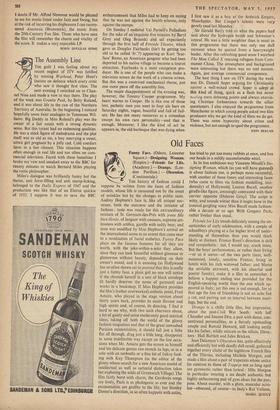The Assembly Line
THE guilt I was feeling about my recent neglect of ITV was fotified by missing Warhead, Peter Hunt's feature on defence which every critic who saw it thought first class. The next evening I switched on to Chan- nel Nine and made a vow to stay there. The play of the week was Granite Peak, by Betty Roland, and it was about life in the raw of the Northern Territory of Australia. In the beginning I noticed hopefully some faint analogies to Tennessee Wil- liams. Big Daddy in Miss Roland's play was the owner of a fair estate with a strong dynastic sense. But this tyrant had no redeeming qualities. He was a stock figure of melodrama and the plot itself was as old as sin, a boy marrying a sweet, nitwit girl pregnant by a jolly cad. Cold comfort farm in a hot climate. This situation happens often enough in real life and too often on com- mercial television. Faced with these banalities I broke my vow and sneaked away to the BBC for twenty minutes to watch Bernard Miles playing the rustic philosopher.
Miles's dialogue was brilliantly funny but the theme, anti form-filling and anti stamp-licking, belonged to the Daily Express of 1947 and the production was like that of an Elstree quickie of 1932. I suppose it was to save the BBC
embarrassment that Miles had to keep on saying that he was not against the health scheme, only against the stamps.
On Sunday I endured Val Parnell's Palladium for the sake of an exquisite five minutes by-Beryl Grey and Oleg Brianski and sat expectantly through the first half of Fireside Theatre, which gave us Douglas Fairbanks (isn't he getting too old to be called `Jr.'?) appearing as Kurt 'Scar- face' Remo, an American gangster who had been deported to his native village to become a tourist attraction. Fairbanks is a most competent pro- ducer. He is one of the people who can make a television screen do the work of a cinema screen. But this was a contrived mechanical theme, just one more piece off the assembly line.
The major disappointment of the evening was, however, the Tommy Cooper programme. My heart, warms to Cooper. He is like one of those lost, pathetic men you meet in four ale bars on Saturday nights, vague, boastful and full of fail- ure. He has not many resources as a comedian except his own rare personality—and that is enough. Moreover, I like the kind of act he appears in, the old burlesque that was dying when I first saw it as a boy at' the Ardwick Empire, Manchester. But Cooper's talents were very poorly used last Monday.
Sir. Gerald Barry told us what the papers ihad said about the hydrogen bomb and Schweizer's appeal. He was a little weightier than is usual in this programme but there was only one dull moment when he quoted from a heavyweight leader. After this refreshing good sense I watched The Man Called X rescuing refugees from Com- munist China. The atmosphere and background were interesting but there was no real tension. Again, just average commercial competence.
The best thing I saw on ITV during the week was Dr. Donald Soper arguing for Christianity against a well-mixed crowd. Soper is adept at this kind of thing,, quick as a flash but never sewing mere debating points and always exercis- ing Christian forbearance towards the sillier questioners. I also enjoyed the programme from Manchester in which young people asked two film producers why we get the kind of films we do get. There was some hypocrisy about crime and violence, but not enough to spoil the programme.
JOHN BEAVAN










































 Previous page
Previous page